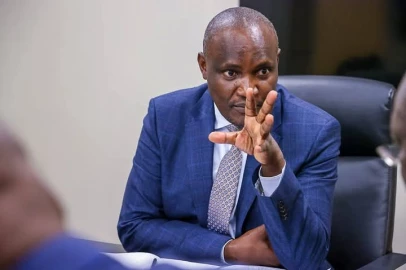- On Monday this week, fuel prices shot up, petrol by Ksh.9, diesel by Ksh.8, and kerosene by Ksh.9. These changes will remain in effect through mid-August. The Energy and Petroleum Regulatory Authority cited an increase in the landed cost of fuel.
 Treasury CS John Mbadi leads a technical team in unpacking Kenya's Debt Position on April 25, 2025.
Treasury CS John Mbadi leads a technical team in unpacking Kenya's Debt Position on April 25, 2025.Treasury Cabinet Secretary John Mbadi has strongly defended the government over Monday’s spike in fuel prices, dismissing claims by Kiharu MP Ndindi Nyoro as misinformed.
Mbadi insisted the increase was driven by the ongoing Israel-Iran war and rising global oil prices.
On Monday this week, fuel prices shot up, petrol by Ksh.9, diesel by Ksh.8, and kerosene by Ksh.9. These changes will remain in effect through mid-August. The Energy and Petroleum Regulatory Authority (EPRA) cited an increase in the landed cost of fuel.
Mbadi affirmed that the cost of landing petroleum had indeed gone up.
But Ndindi Nyoro was not convinced.
“We saw the prices of fuel going up drastically yesterday, and the explanation that was given by the government was not accurate. Because blaming the global oil prices is falling short of what the reality is,” said Nyoro.
Mbadi, in turn, fired back, saying, “When you start misreporting and giving statements that are not factual—and you've been chair of the Budget and Appropriations Committee—then you leave Kenyans asking whether you have what it takes to offer leadership at any level."
"You cannot say that petroleum prices have gone up because the government has diverted stabilisation funds to pay or take secret loans. What is secret about securitisation?”
While Nyoro did not directly tie the price hike to the securitisation, he claimed that domestic fuel prices no longer reflect global trends.
He attributed this to what he described as secretive government borrowing, questioning the rationale behind securitising a portion of the road maintenance levy.
“In a non-oil producing country like Kenya, the only tool the government is left with is altering the levies and taxes,” said Nyoro.
“The government actually added a new levy last year in the fuel prices, and how the government works—you time it when the fuel prices are coming down. That’s why Kenyans never felt the global deceleration of prices, because it’s around that time that the government introduced a secret Ksh.7 in the fuel levy.”
In a statement to newsrooms, Roads Cabinet Secretary Davis Chirchir strongly defended the securitisation plan, saying, “This is not the creation of new debt. It’s the sale of rights to a portion of the levy, executed transparently and with full legal oversight from the National Treasury and the Attorney General.”
Nyoro, however, maintained his criticism: “The problem with this is that we now have the government spending money in advance. They have already collected money in advance for the next seven years."
"So if Kenyans demand lower fuel prices and you have already taken loans using the taxes and levies, how are you going to alter the pump fuel prices? Because the only tool you have is taxes and levies—and it’s the one you’ve already securitised.”
Mbadi defended the plan, stating, “If we settle these historical pending bills, we won’t have to securitise every year just to pay them.”
However, even as the government stands by the move, it is emerging that the Treasury is now eyeing an additional Ksh.5 from the remaining Ksh.18 in the levy, raising eyebrows.
“We feel that you’re using these Ksh.18 on murram roads that are not helping the economy, and a lot of it is eaten. Agreements between contractors, politicians, and regional road managers—we know it,” said Mbadi.
Meanwhile, Kenyans have raised concerns over why the government chose not to stabilise fuel prices this month, despite collecting a petroleum development levy at the pump meant to cushion consumers from such shocks.
“The government chooses when to intervene,” explained Mbadi. “EPRA, from my understanding, felt that now we don’t have to intervene—because if you intervene too early, you can deplete the fund.”
The government has remained adamant that the securitisation of certain funds is the only viable way to provide short-term fiscal relief to the country.
But not everyone agrees. Some have argued that this is a classic case of mortgaging the country’s future potential. Kenyans can only wait and see the true cost of the government’s decision to once again kick the can down the road.
©Citizen Digital, Kenya
 5 days ago
165
5 days ago
165


